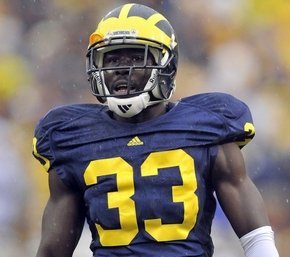
Langston Hughes wrote, “What happens to a dream deferred? Does it dry up like a raisin in the sun or fester like a sore and then run? Does it stink like rotten meat or crust and sugar over like a syrupy sweet? Maybe it just sags like a heavy load or does it explode?”
It appears to me Hughes’ poem was written especially for former Cass Tech and University of Michigan star cornerback, Bourbacar Cissoko.
COMMENTARY
What a dream story Cissoko started out to be. He came to America in middle school and had never played football in his native country of Ghana, Africa, only soccer. “I tried to encourage him to stick with soccer,” said Terence Willis, his uncle-in-law and guardian, “because I thought he did not have the right size for football. But he proved me wrong showing a determination and grit that surprised me. He saw that most of the American kids were playing football and he was determined to learn the sport.
“Cissoko played on the Cass freshman team with my son, Leighton, and I used to give him a ride home from practice almost every day. I remember talking with him and he told me he dreamed that he would one day earn a scholarship to play football.”
Man, did his dream ever come true! He went on to become the best cornerback in the state, EA Sports All-America second team, PrepStar All-American and the nation’s No. 3 cornerback according to Scout.com. He played in the prestigious Army All-American Bowl and earned a scholarship to UM. Dream achieved!
Fast forward to now, two years later and Cissoko’s dream has been deferred indefinitely after pleading guilty to three robbery charges in Washtenaw County Circuit Court. He has been in jail over two months and after his recent arraignment he could face a maximum of 45 years in prison if a judge throws the book at him on his Aug. 10 sentencing.
How does this happen to a young man with so much promise? I hear all the stuff calling him stupid for the situation he now finds himself in. I know this kid personally and that is just the easy way out. The facts are undeniable in this case, but too often we judge young people like they are adults. But there is more to Cissoko’s story than he’s just a knucklehead.
“This is a kid that has a lot of good qualities,” said his Cass coach, Thomas Wilcher. “He always challenged himself to be better. Coming from Africa and just learning football, he proved what kind of competitor he is. Plus he was always respectful and would go out his way to help teammates and even me.
“I think not being from America, not a US citizen, he tried too hard to fit in and be like what he thought was the cool thing to be once he got to Ann Arbor.”
Now you take a young man, who Willis said was on a strict regiment while living with him and his wife, Fatoumata (Cissoko’s sister) and you put him in an unstructured college environment. Now his peers, like almost all of us, push you to try weed and alcohol and you do it and like it. This happens on every college campus in America every day to naïve freshmen.
I know some will read this and say that I’m making excuses for another wayward athlete. But there is a bigger picture here, an opportunity to examine the complexities of adolescents and the peer pressure to engage in intoxicating substances. I’m postulating that substance intervention could have saved this young man like it has for millions across America. It’s just that colleges are so worried about their image that they are quick to toss a person aside.
The signs were there when Cissoko was booted from the team during the 2009 campaign for unspecified reasons, but most that know him knew it was for repeatedly missing classes, workouts and study sessions. Now this is a kid that almost never missed a class at Cass or in his freshman year at UM. Willis said Cissoko loved football, so why would he miss practice? He needed the long hand of fellowship extended, but instead he got the boot.
What happens to a dream deferred? Hughes says, “Maybe it just sags like a heavy load or does it explode?” Kicked of the team, no scholarship and no place to live that was his own. We all see the results of a desperate, depressed kid screaming inside himself. Psychologists have documented that internal conflicts lead to external actions — mostly negative.
“It is ironic that we kept him safe from the jaws of the beast in Detroit,” Willis said, “but once he got to Ann Arbor he ends up in Washtenaw County jail and not Wayne. Sure he made those decisions and they were wrong, but once he got kicked off the team he went into depression. He did not want to talk because he was ashamed and embarrassed. He had not been exposed to substances and he did not know how to handle it.
“I hope the judge sees what we see and what coach (Lloyd) Carr saw. This is a kid that has never been in any trouble and his mistakes did not lead to any person getting hurt. He snatched money from delivery people and robbed a cab driver with a pellet gun. I’m not downplaying anything he did, but this is a kid that can be saved.”
Leland Stein can be reached at lelstein3@aol.com.